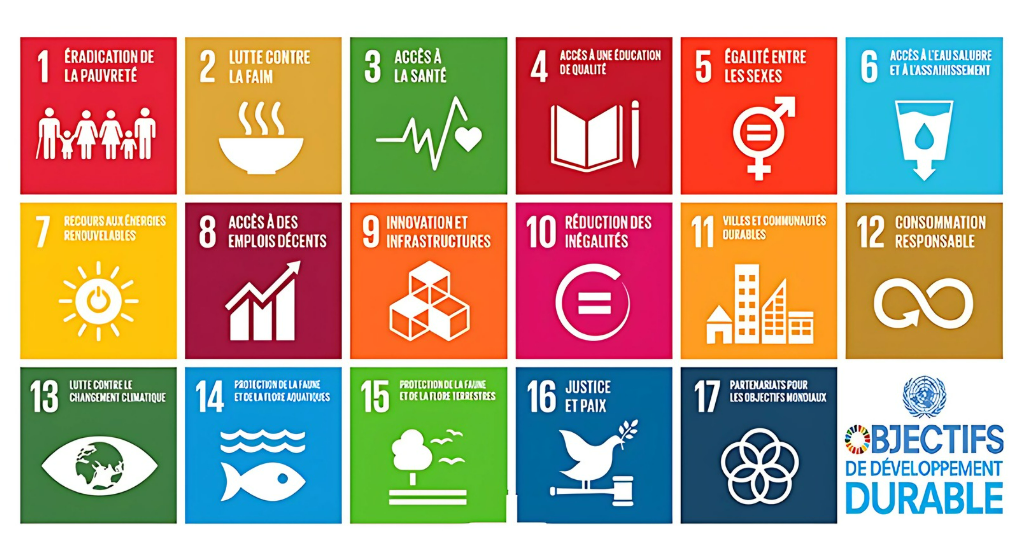CSR and the SDGs: strategic levers for sustainable development

Corporate Social Responsibility (CSR) and the Sustainable Development Goals (SDGs) are two fundamental concepts shaping the future of sustainable development. The 17 SDGs, adopted in 2015 by the UN in the Agenda 2030, offer a universal roadmap for tackling environmental, social and economic challenges.
In this context, CSR enables companies and organizations to adopt more responsible practices and integrate these objectives into their operations. Today, a well-structured CSR approach is more than just regulatory compliance; it represents a genuine lever for performance and innovation.
But how can CSR and the SDGs be effectively linked? What are the benefits for companies, and how can they measure their impact? And what kind of support can facilitate this transition?
1. Understanding CSR and the SDGs
1.3.The 17 Sustainable Development Goals
2. Implementing the SDGs through CSR
2.1. Strategic alignment of companies
2.2. Concrete actions and best practices
2.3 Measuring, monitoring and enhancing impact
3. Support and transition to a responsible approach with GCI
3.1 The importance of tools and expert support
3.2 GCI supports companies in their environmental transition
Understanding CSR and the SDGs
💢Definitions and issues
Corporate Social Responsibility (CSR) refers to the voluntary integration of social, environmental and economic concerns into the management of an organization. It is based on the idea that companies should not only seek financial profitability, but also make a positive contribution to society and the preservation of the environment.
The Sustainable Development Goals (SDGs), for their part, constitute a global framework for action in response to major global challenges. They concern all players, from governments to business and civil society.
7️⃣Les seven pillars of CSR
ISO 26000, the benchmark for CSR, defines seven key areas for action:
The Sustainable Development Goals (SDGs), for their part, constitute a global framework for action in response to major global challenges. They concern all players, from governments to business and civil society.

💚The 17 Sustainable Development Goals
The Sustainable Development Goals (SDGs) were adopted in September 2015 by the United Nations from the "2030 Agenda for Sustainable Development: 17 sustainable development goals to eradicate extreme poverty, combat inequality and preserve the planet.

Among those of direct relevance to companies:
- SDG 8: Decent work and economic growth - promoting decent and sustainable employment.
- SDG 12: Responsible consumption and production - reduce waste and improve resource use.
- SDG 13: Climate action -mitigating the effects of climate change.
Integrating these objectives into CSR enables companies to align their strategy with major societal challenges.
Master a new vocabulary to ensure the long-term future of your company.
Implementing the SDGs through CSR
✅ Corporate strategic alignment
To be effective, a CSR approach must be aligned with the SDGs relevant to the company. This implies :
- Impact analysis: Identify the effects of the company's activities on the environment and society.
- Define a vision and commitments: Develop a coherent strategy tailored to the sector's challenges.
Set measurable objectives: Use precise indicators to monitor progress.
✳️Actions and best practices
Here are just a few of the initiatives adopted by companies committed to a CSR strategy:
- Eco-design and waste reduction: use of recycled materials and optimized packaging.
- Equality and well-being at work: implementing diversity and flexibility policies.
- Energy transition: switching to renewable energies and reducing CO₂ emissions.
- Social commitment: partnerships with NGOs and corporate philanthropy initiatives.
📊 Measure, monitor and enhance your impact
The evaluation of CSR actions involves :
- The GHG Balance to quantify greenhouse gas emissions.
- Extra-financial reports (CSRD, GRI, etc.) to communicate commitments.
- Labels and certifications (ISO 14001, B Corp, etc.) to attest to best practices >.
Rigorous monitoring not only improves strategy, but also enhances credibility with stakeholders.
Support and transition to a responsible approach with GCI
⚙️L the importance of tools and expert support
To structure their CSR commitment, companies can benefit from expert support and dedicated tools. These solutions enable you to :
- Diagnose carbon footprint and identify areas for improvement.
- Define concrete, achievable action plans.
Promote results to investors, customers and partners.
💡 GCI supports companies in their environmental transition
GCI offers comprehensive expertise to help organizations structure their ecological transition:
- A detailed carbon footprint analysis.
- A personalized action plan to reduce emissions.
- Solutions tailored to the constraints and ambitions of each structure.
Thanks to this support, companies such as FFBad have been able to make informed decisions and implement concrete actions for a more responsible sport.
Today, CSR and the SDGs are key elements in the transition to a more sustainable world. Companies have an essential role to play in integrating these principles into their strategy, with concrete, measurable actions.
The FFBad example illustrates the importance of support from experts such as Global Climate Initiatives, who facilitate this transition and enable organizations to turn their commitments into concrete results.
Together, let's build a more responsible and sustainable future. 🌍✨
Our carbon experts will be happy to give you a free free demonstration of our platform. 🚀
We aim to meet ministerial requirements and guidelines by promoting more responsible sports and raising awareness among our members and the general public.







